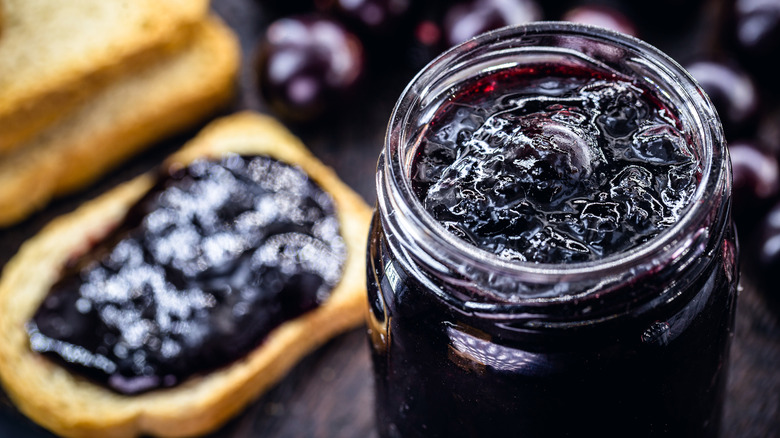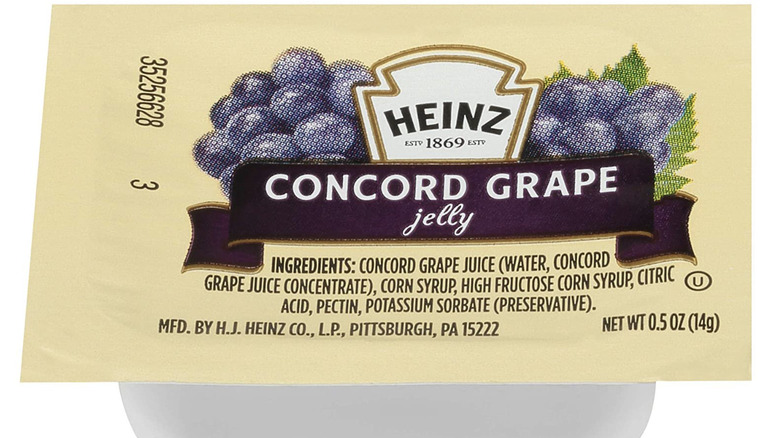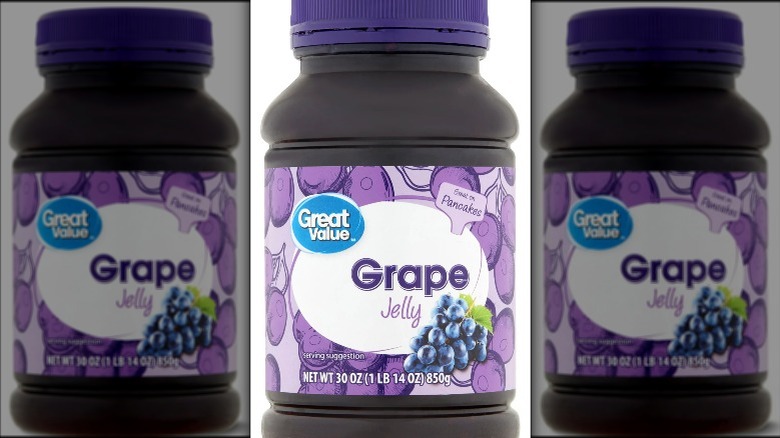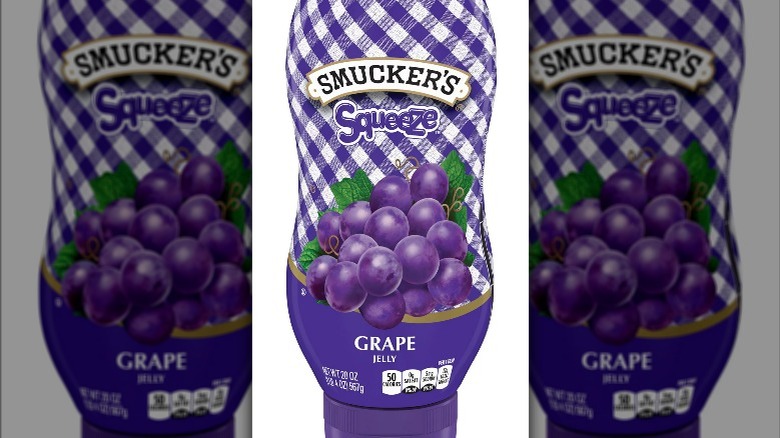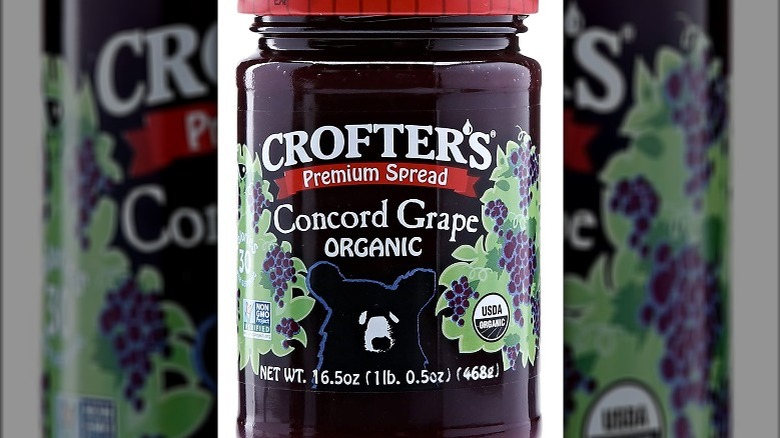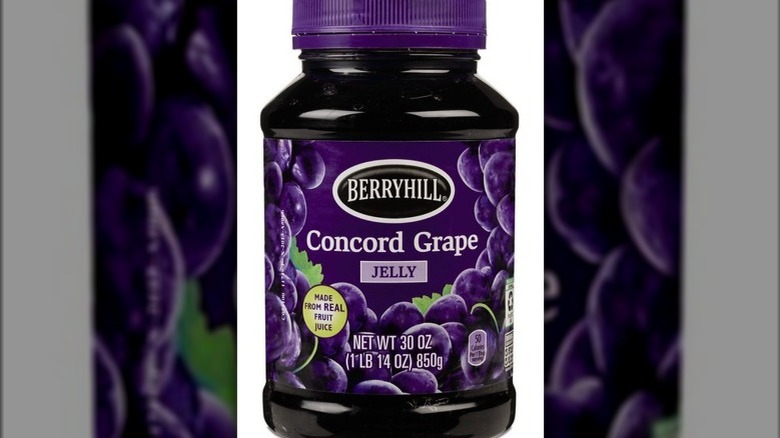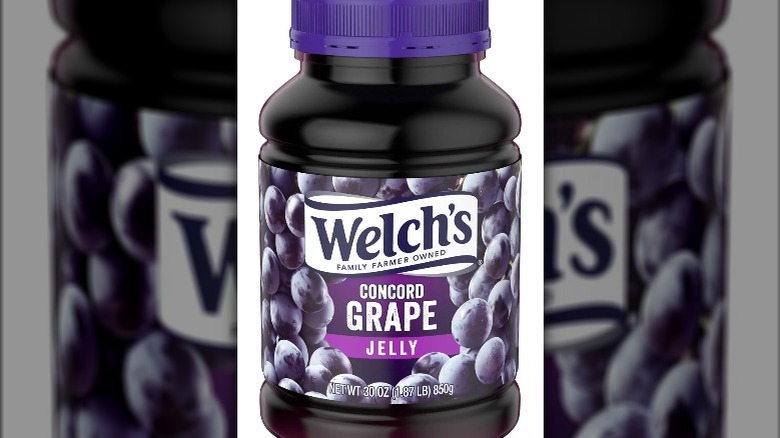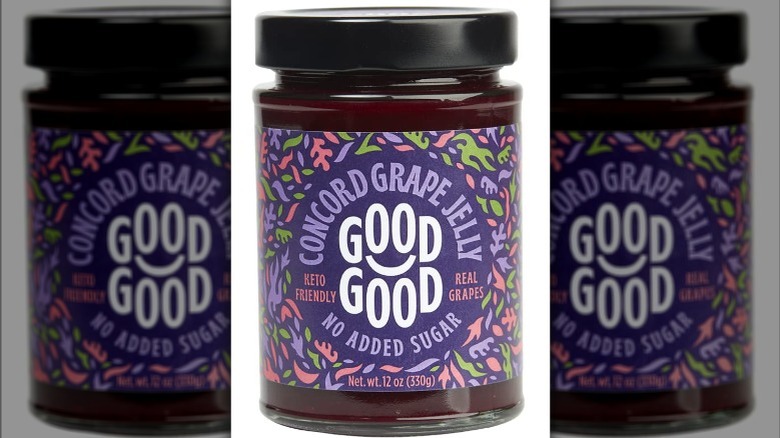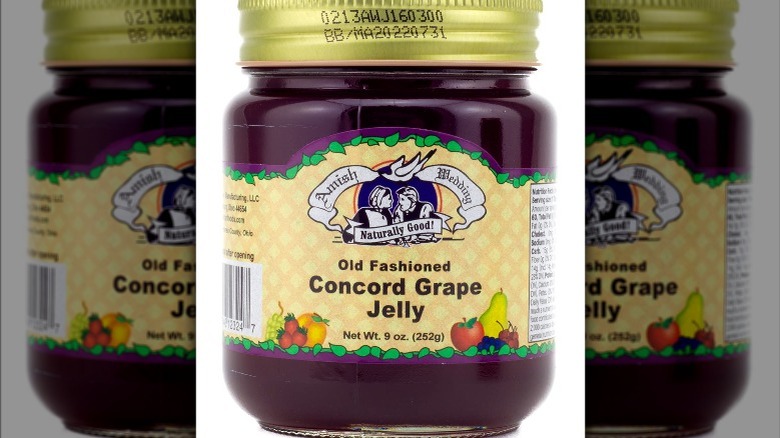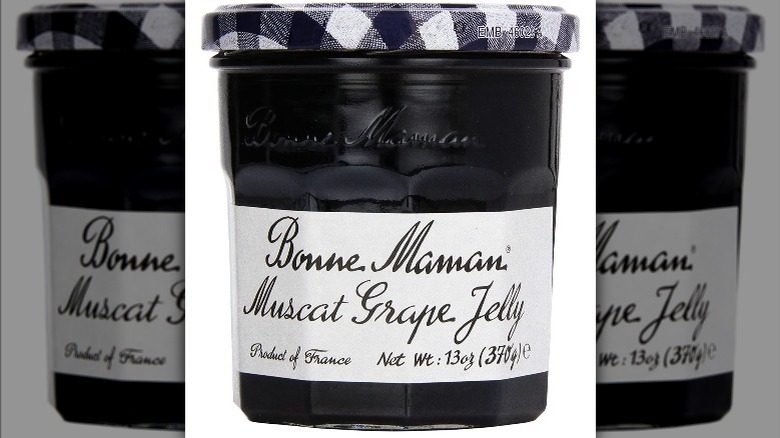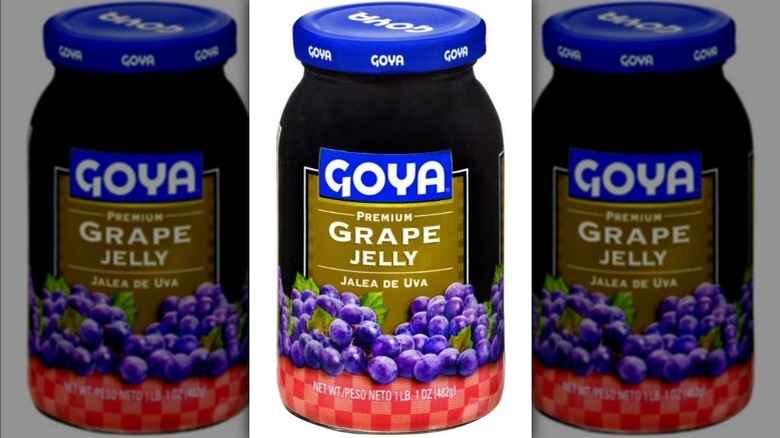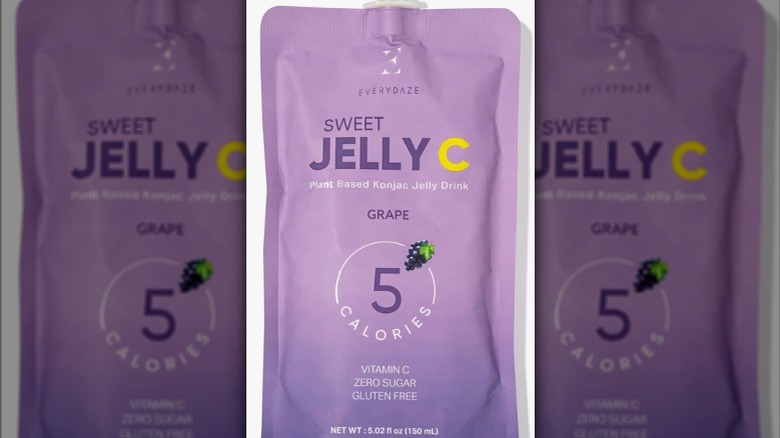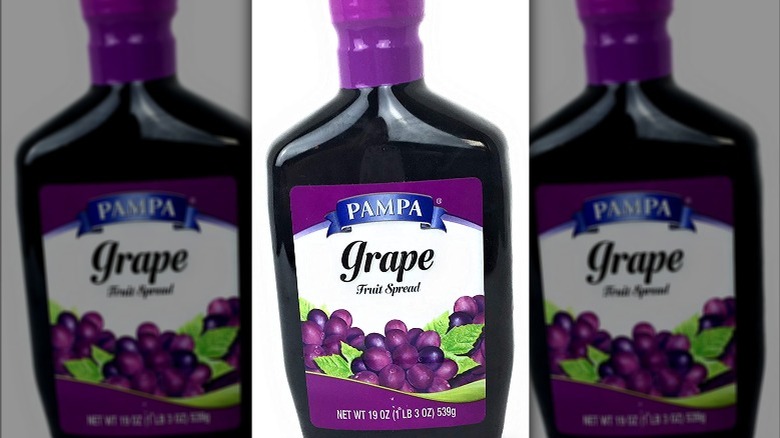The 12 Unhealthiest Store-Bought Grape Jelly Brands
Grape jelly: You just gotta love it. This spreadable treat has seen countless people through their lives, from their earliest years on the playground, tucking into a peanut butter and grape jelly sandwich, to their adulthood, tucking into a peanut butter and jelly sandwich at the office. Grape jelly's popularity is evergreen, and after strawberry jelly, it was the second-most consumed jelly, jam, or preserve flavor in the United States, per Statista. People just can't get enough of that sweet taste — ourselves included.
And, naturally, so many of those jelly sandwiches have been fuelled by brands that people have known for decades. But while the process of making grape jelly on an industrial scale is actually pretty similar, in terms of the stages that the fruit goes through to become a spread, store-bought jelly brands often have ingredients added in to make them sweeter, tastier, or last longer. And if you're eating certain grape jelly brands on the regular, this can become a problem. Sure, few people are under the illusion that grape jelly is a healthy food, but in some cases, what's actually in those jars can be pretty surprising and unhealthy. And we're gonna reveal everything you need to know, right here.
Heinz Grape Jelly
When Henry J. Heinz first used his mother's homemade horseradish recipe to start a food business back in 1869, he can't possibly have known how big his name was going to get. Cut to 150-odd years later, and Heinz is a food titan, with an extraordinarily large product offering. One of these is grape jelly, which it sells in single-serve, squeezable packets. But although this might make it convenient to enjoy your grape jelly fix on the go, it might not be so convenient for your nutritional needs.
A single packet of Heinz Grape Jelly contains 14 grams of grape jelly, and six of these grams are comprised of added sugar. For those math buffs out there, that means that, yep, almost 50% of the spread is pure sugar. And while six grams may not seem like that much in the grand scheme of things, that's a pretty big amount of the adult daily recommended intake, approximately one-sixth of the suggested amount for men and almost a quarter of the guideline amount for women. Excessive added sugar can have a lasting effect on your health, impacting your heart, causing inflammation throughout the body, and potentially contributing to fatty liver disease, per Harvard Health Publishing.
Great Value Concord Grape Jelly
A good grape jelly shouldn't cost the world, and a big part of its appeal as food is its easily-available nature and intense taste for a low price. And if you're on a budget, it doesn't get much cheaper than Walmart's Great Value Concord Grape Jelly. At just a couple of bucks for a 30 oz. jar, this product is both family and wallet-friendly.
What's less friendly about it, though, is its ingredients list. Part of why Great Value Concord Grape Jelly is so reasonably-priced is because it resorts to using cheaper, mass-made sugars to make it so sweet. This grape jelly contains both corn syrup and high fructose corn syrup, two similar sweeteners that are ultra-high in sugar. While neither is exactly bursting with nutrition, it's the high fructose corn syrup that you need to look out for. Debate still continues about whether high fructose corn syrup is worse for you than regular sugar, but as it is comprised mainly of fructose, a type of fruit sugar, it has a similar detrimental impact in higher quantities. Eating high fructose corn syrup regularly can contribute to obesity, diabetes, and worse dental health, via Medical News Today.
Smucker's Squeeze Grape Jelly
If you've bought grape jelly before, there's a high likelihood that it was Smucker's. The brand has got its jellies, jams, and preserves down to an art form, with more than 120 years of experience going into honing its food.
But there's no getting around the fact that its grape jelly is sugary — very sugary. Smucker's Squeeze Grape Jelly, which comes in a squeezable bottle for maximum convenience, has a suggested serving size of one tablespoon. And in each tablespoon is a pretty eye-popping 14 grams of sugar, and nine grams of added sugar. Not only is this concerning for adults who might be eating this grape jelly, but given that this food is a firm favorite of kids as well, you might want to be on your guard. That nine grams of added sugar is over a third of the entire daily recommended allowance for kids over the age of two, which currently sits at 25 grams.
The impact of this added sugar is, of course, most obviously seen in your kids bouncing off the walls, says pediatric dietitian Jennifer Hyland, per the Cleveland Clinic. But it can also have a longer-term impact, with regular consumption of added sugar contributing to health concerns like diabetes and obesity later down the line.
Crofter's Organic Concord Grape Premium Spread
In a world of grape jellies that have a few, shall we say, intense-sounding ingredients on their labels, Crofter's Organic Premium Spread line can seem comforting. Crofter's Organic's Concord Grape flavor promises an organic experience, and it's certainly true that its grape puree and its cane sugar are both labeled as such, which might indicate a more nutritious meal.
The issue, though, is that even though the sugar Crofter's is using is organic, that doesn't necessarily make it healthier. "When you eat sugar, the body does not make a differentiation between organic and non-organic sugar sources. The body treats sugar as sugar," states registered dietitian nutritionist Kim Rose via EatingWell. The nutritional structure of the ingredient remains the same, although organic sugar may have been produced with more rigorous guidelines around sourcing, soil quality, and which additives can be used — and so the body deals with it in the same way, spiking blood sugar and playing into your larger health picture.
And whether organic or not, each serving of Crofter's Organic Concord Grape Premium Spread contains seven grams of sugar, with six grams of added sugar. That's still a fairly high amount for a tablespoon of grape jelly, y'all.
Berryhill Grape Jelly
Aldi is a total pro at creating a product line that tastes and looks just as good as more recognizable brands but at a lower cost. That's proved by its Berryhill Grape Jelly. This spread, which has a similar jar shape, label, and coloring to several other well-known grape jelly options, is available at stores nationwide. But that doesn't mean it's necessarily good for you.
One look at the Berryhill Grape Jelly label will tell you just how unhealthy this option is. The product is comprised of sugar, sugar, and more sugar, with ten grams per serving, and a full 10(!) of these grams being added sugars. Additionally, there's little attempt to make it more nutritious by way of added vitamins and minerals. The process of fortifying foods with vitamins and minerals is a longstanding one in the United States, and enriched foods can be particularly useful ways for kids to get the nutrients they need, according to Healthline. You might also hope that, even if this grape jelly wasn't fortified, some of the nutrients that are naturally present in grapes like vitamins C, K, and the mineral potassium might make it into the jar. No such luck, folks. It's all sugar from here on in.
Welch's Grape Jelly
Welch's Grape Jelly is, for many, the go-to option. This ever-popular choice has been around seemingly forever, and many a kid (and adult) has had breakfast or lunch fuelled by its flavors. But upon closer inspection, Welch's may not be the best option nutritionally. This jelly has a serving size of one tablespoon, in which there are 13 grams of sugar, enough to put your teeth on edge (or cause you to need a trip to the dentist). And all of that sugar contributes to an elevated calorie count.
At 50 calories per serving, it not only makes a small, but noticeable dent into your recommended caloric intake, but it does so through nutritionally void calories. "Empty calorie foods commonly are designed for you to crave and consume those foods often and in large quantities which further leads to consuming excess calories and poor nutritional intake," says registered dietitian Julia Zumpano, per the Cleveland Clinic. Although Welch's Grape Jelly isn't a food that you might have every day, it's always wise to try and eat foods that contain valuable nutrients, vitamins, and minerals, as well as energizing calories.
Good Good Concord Grape Jelly
It's probably no surprise that most grape jellies are loaded with sugar (although the sheer amount of sugar in some options may surprise you). But in this modern day and age, there's more than one way to sweeten things up. The snappily-named company Good Good has cottoned on to that, making a range of jellies and spreads that promise to "help people cut down their sugar consumption without sacrificing sweetness or happiness from their life," according to its website. And its Concord Grape Jelly is definitely made in line with that ethos, with just a single gram of sugar and 5 calories per serving, making it suitable for folks on low-carb and keto diets.
So where does it get its sweetness from? The answer is via two sources, stevia and erythritol, which are both low-calorie sugar substitutes. And although these might seem like miracle additions to your diet, both of them have slightly troublesome potential impacts on health. Stevia, for example, may alter the balance of some individuals' gut bacteria, and may even make you more hungry, causing you to eat more, per Healthline. Erythritol, meanwhile, could cause you to have an upset stomach and more gas, and may even cause increase blood clotting (via Healthline).
Amish Wedding Old Fashioned Concord Grape Jelly
Some brands just totally nail that rustic feel, making you believe that the product you're buying was made by a friendly, generous neighbor. And when a product has that kind of vibe, it can also be tempting to believe that there's nothing in it but wholesome goodness.
Amish Wedding Old Fashioned Concord Grape Jelly definitely has that feeling — but its nutritional values aren't necessarily as wholesome. This grape jelly, like so many others, is made predominantly from sugar and has roughly 10 grams (or two teaspoons) in each serving. This amount wouldn't necessarily feel as glaring if Amish Wedding Old Fashioned Concord Grape Jelly also had some other healthful benefits, but one glance at its label shows a whole lot of zeros for other nutritional values. There are no vitamins or minerals which could provide valuable nutrients and health-boosting qualities, no protein to help the body repair and grow, and no fiber to keep your digestive system ticking along smoothly. Just a whole lotta sugar, and nothing else.
Bonne Maman Grape Jelly
Bonne Maman is undeniably a classy choice when it comes to grape jelly. Saying adieu to the classic bumper-sized, purple-heavy plastic jars that so many other grape jellies come in, Bonne Maman prefers to deliver its spread in a very chic jar that wouldn't look out of place in Emily in Paris. While it might have nailed its aesthetic, though, its ingredients still raise a few eyebrows here and there.
As with other grape jellies, Bonne Maman is high in sugar, with 13 grams in each tablespoon serving. And it achieves its jelly-like, spreadable texture through a thickener called pectin. Pectin is a soluble fiber that naturally occurs in fruits like apples, pears, strawberries, and peaches. As a fiber, though, it can have an impact on the digestive system. And while in most people pectin is well-tolerated in the kind of quantities you'd get in grape jelly, in some people it might result in digestive upset, like gas, stomach cramps, and diarrhea, per WebMD. It's worth pointing out that Bonne Maman isn't unique in using pectin, and it's a common ingredient in grape jellies and other jelly flavors — so if you have trouble with this brand, you might with others, too.
Goya Grape Jelly
Goya is known for its wide range of products, many of which are canned or preserved. And so it's little surprise that it has its very own grape jelly to bring to the table. But, alas, if you were hoping for it to be a little bit healthier than others, you'd be mistaken. Goya Grape Jelly is super-high in sugar, with 8 grams per tablespoon serving. Interestingly, at 53 calories in the same serving size, it's also one of the more calorie-dense offerings out there.
Another thing to note is where this sugar content comes from, which is supplied not just by corn syrup, but fructose. Fructose is one of the main types of sugar (the other being glucose) and is naturally produced in fruit, which can lead some people to assume that it's a healthier type. The opposite, however, may be true. Because fructose has to be processed and metabolized by the liver before the body can use it, eating too much of it can cause the organ to have to work harder, as Healthline explains. This can have knock-on effects on your health, with weight gain and several chronic diseases believed to be made more likely by eating fructose in excess.
Everydaze Sweet Jelly C, Grape Flavor
Every now and again, we just have to pause and remember how far food science has come. It used to be that if you wanted something sweet, like grape jelly, you had to accept the fact that you were going to have to eat sugar. But now? Things are different.
Everyday Sweet Jelly C supplies all the sweetness, with none of the sugar and only 5 calories, in its grape flavor. Coming in a squeezable pouch, each jelly is made with konjac, a gelatin substitute that can create a jelly-like consistency while remaining super-low in calories. Into the jelly also goes grape flavoring, low-calorie sweeteners, and a few other additives.
So far, so good, you might be thinking — except some of those additives are not great. One of the many ingredients in Everyday Sweet Jelly C's grape flavor is carrageenan. While carrageenan is used widely in food production, that doesn't mean it's great for you, and some studies have pointed towards its potential to increase inflammation, worsen IBS, or even contribute towards bowel cancer, per Healthline. As well as this, this grape jelly also contains sucralose, part of what gives it its sweet flavor. Sucralose has been found to harm gut health and healthy gut bacteria, and while it's a low-calorie sweetener, it may even cause people to consume more calories overall (via WebMD).
Pampa Fruit Spread, Grape Flavor
Why get one, when you can get both? Pampa Grape Jelly is available at Walmart as part of a two-pack with the brand's Strawberry Jelly, so shoppers looking for a bit of variety might reasonably be drawn to this option. But in both flavors, there's not only a bumper amount of sugar but an additive lurking in the ingredients list which you probably won't want to eat.
That ingredient is sodium benzoate, which is used to extend the shelf-life of many products, including jams and jellies. This man-made additive has proved to be controversial over the years, due to its potential ability to raise the risk of cancer, per Healthline. Sodium benzoate can change into benzene, a chemical that may also be carcinogenic.
To add to this, sodium benzoate has been found to potentially increase the possibility of inflammation. A study published in Physiology International discovered that when sodium benzoate was ingested, it prompted inflammatory pathways, and therefore made the likelihood of experiencing inflammation higher. It should be pointed out that in low levels, sodium benzoate is approved by the FDA, and it doesn't stay in the body long. But as there are lots of choices out there that don't use the additive, you might want to opt for those instead.
